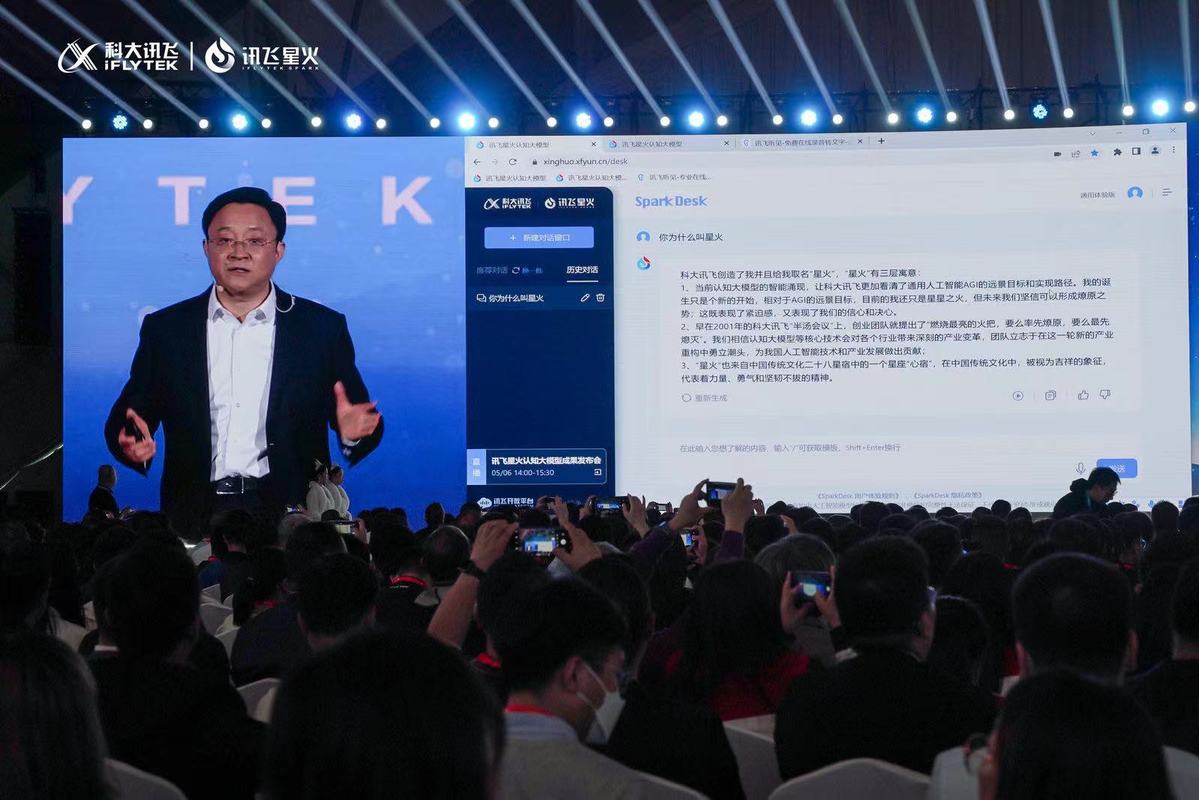China's State-Sponsored AI Claims it Will Surpass ChatGPT by End of Year
Also claims the "dawn of artificial general intelligence"

Chinese company iFlytek yesterday threw itself at OpenAI's bread and butter by announcing a product that's aimed to compete with ChatGPT. The company's "Spark Desk" was described by the company's founder and president Liu Qingfeng as a "cognitive big model" and even as the "dawn of artificial general intelligence." Beyond those buzzwords was also a promise, however: that Spark Desk would surpass OpenAI's ChatGPT by end of year.
We should be happy that we can chalk some of the above to corporate marketing buzzwords. I can assure you my mind will be elsewhere if/when I have to write an article announcing that Artificial General Intelligence (AGI) is here. Perhaps even more so if that AGI was Chinese, as I'm unsure I can trust an AGI that thinks social scoring systems are the bread and butter of its "cognitive big model."
All that aside, however, there are a number of interesting elements to this release. Every day we hear of another ChatGPT spawn, whether official or unofficially linked to the work of OpenAI. With the tech's impact being what it is (even if that impact is still cloudy and mostly unrealized), it was only natural that every player with enough money and expertise to pursue its own models — adapted to their own public and stakeholders — would do so.
Of course, the question is whether iFlyTek and Spark Desk can actually deliver on its claims, specifically that of one-upping OpenAI at its own game. The answer will likely depend on multiple factors and how you view the subject.
ChatGPT wasn't made for the Eastern public. There's a training data, linguistic and cultural chasm that separates ChatGPT's impact on the Eastern seaboard compared to the Western world. And by that definition, it's entirely possible that "Spark Desk" will offer Eastern users a much improved (and more relevant) user experience compared to ChatGPT, given enough maturation time. Perhaps that could even happen before the end of the year. It certainly already offers a better experience for Chinese users in particular, as the country pre-emptively banned ChatGPT from passing beyond its Great Firewall (except in Hong Kong).
The decision to ban ChatGPT likely stifled innovation that it would have otherwise triggered. We need only look to our own news outlets to see the number of industries being impacted by the tech. That's something no country can willingly give up on at a whim; it really was simply a matter of time before a competent competitor was announced.
We'll have to wait for years' end to see whether iFlytek's claims materialize or evaporate. It'll be hard enough to quantitatively compare the two LLMs, especially when their target users are so culturally different. One thing is for sure: OpenAI won't simply rest on its laurels and wait for other industry players to catch up, especially not when there's a target date for that to happen.
The ChatGPT version iFlytek's Spark Model will have to contend with won't be the same GPT we know today. Perhaps OpenAI's expertise and time-to-market advantages will keep it ahead in the race (and that's what we'd expect); but we also have to remember there are multiple ways to achieve a wanted result. It's been shown that the U.S.'s technological sanctions against China have had less of an effect than hoped for, and that the country is willing to shoulder the burden (and costs) of paying for the training of cutting-edge technology in outdated, superseded hardware — millions of dollars and hundreds of extra training hours be damned.
A few extra billions could be just enough to bridge the gap. That's China's bet, at least.
Get Tom's Hardware's best news and in-depth reviews, straight to your inbox.

Francisco Pires is a freelance news writer for Tom's Hardware with a soft side for quantum computing.
-
GoldyChangus Reply
The advancement it's made in the last year is impressive, that's why it's going full hype overloadDavidMV said:Don't get me wrong, AI will do some amazing things and help some of us accomplish our tasks faster. But it is way over hyped at this point. We are seeing the next huge bubble in the making. People aren't even sure how to monitize it well yet. If you are an investor, it is okay to ride the wave but I recommend jumping ship in a couple years. This isn't as big as the PC or the Internet. We are so far away from artificial general intelligence it isn't even worth talking about yet. Current AI isn't thinking, it isn't inventing and it isn't self aware. No one has the first clue how to pull that off yet. -
bit_user Reply
Not true. There are plenty of startups and businesses already using the tech.DavidMV said:People aren't even sure how to monitize it well yet.
Why do you think that's a prerequisite for the tech to be profitable?DavidMV said:If you are an investor, it is okay to ride the wave but I recommend jumping ship in a couple years. This isn't as big as the PC or the Internet. We are so far away from artificial general intelligence it isn't even worth talking about yet. Current AI isn't thinking, it isn't inventing and it isn't self aware. No one has the first clue how to pull that off yet.